Frankly and Personally about the Balkans
Adelina Marini, August 5, 2014
A really sincere conversation about the process of European integration of the Western Balkans has long been due. And although this conversation should have taken place long time ago, the timing right before the formation of the new European Commission and in the beginning of the new term of the European Parliament is very good. Moreover, it took place in the EU's newest member state which proved to be genuinely committed to help its neighbours accelerate and invest more quality into their integration processes. And although Croatia Forum was held for a ninth year in a row, its July 2014 edition will remain in history as the forum during which everyone spoke openly and frankly about the problems of the countries in the region, in the EU, the geopolitical influences and which can serve as a foundation for future policies. A forum in which participated also analysts both from big European think-tanks but also from local ones with ideas about the future. A clear success for the Croatian diplomacy, especially bearing in mind that the event in Dubrovnik ended with a long-due apology by Serbia for the bombing of this historic and culture heritage which is under protection by UNESCO.
It's the geopolitics, stupid!
The most fundamental achievement of Croatia Forum 2014 was the drawing of the geopolitical spheres of influence which later served as a starting point for many of the statements and proposals. Representatives of three of the world's greatest powers addressed the forum - US, Russia and China. Victoria Nuland, Assistant Secretary of State, made it clear that Washington is much more interested in the developments in Ukraine than in the Balkans. This is the key to peace in Europe, she said underscoring that now more than ever we should work for Europe's energy independence. Fu Ying, chairwoman of the foreign affairs committee of China's parliament, said that China has no issues with the EU growing bigger because the country will continue to be focused on itself in the coming decades. China needs a peaceful environment and a stable neighbourhood to be able to realise the "Chinese dream" - better life and greater prosperity for the country.
To Russia, however, the Balkans are a sphere of influence which Moscow has no intention to give up upon. Russia's deputy Foreign Minister Alexey Meshkov said that the Balkans play an important role in Russian foreign policy because of common history, long-standing friendship, common Slavic roots and religious kinship. He recalled that Russia agrees "with EU's argument" that the integration of the Western Balkans with Europe is something good and is an important factor for stability and economic growth in this part of Europe. "But as it often happens real life, it turns out to be more complicated than any model". Meshkov hinted that not all pieces of advice Brussels disseminated through the years as well as the money it invested in the form of technical assistance delivered the desired results.
"And an important question to be answered is how much the prescription by Brussels helps in tackling social and economic problems of the region. We would not want the European Union to act more and more like a dog in the manger and use the Western Balkans as merely a sphere of influence of the EU and limit their interaction with the rest of the world. [...] One can hardly expect this to happen in immediate future. [...] This is why it is increasingly urgent to solve the problem of how to reconcile the focus of the Western Balkans on integration with Europe and interests of the Western Balkans states in their relations with the rest of the world". Moscow believes that the EU is forcing the countries from the region to impose sanctions against Russia and said this was unacceptable. The countries from the region should not be forced to choose. In the same time, Mr Meshkov added, Russia should be consulted during the accession negotiations in order to ensure that the Russian interests in the region are protected.
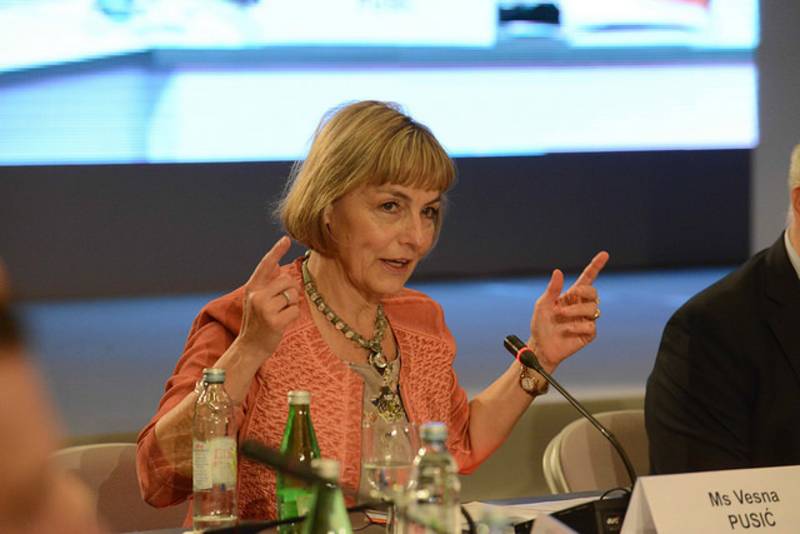 Many of the regional representatives pointed out the geopolitics as a serious factor too, which should be taken into account when talking about the Western Balkans' European integration. One of the strongest and most comprehensive statements on almost all issues in Dubrovnik was that of Slovakia's Foreign Minister Miroslav Lajcak, who since his times as a special representative of the international community in Bosnia and Herzegovina has a strong interest in the developments in the region. He said that one of the things that have changed since the Thessalonнki commitment is the geopolitical context. The good news, in his words, is that the region has already made its strategic choice with one or two exceptions and does not suffer from strategic dilemmas.
Many of the regional representatives pointed out the geopolitics as a serious factor too, which should be taken into account when talking about the Western Balkans' European integration. One of the strongest and most comprehensive statements on almost all issues in Dubrovnik was that of Slovakia's Foreign Minister Miroslav Lajcak, who since his times as a special representative of the international community in Bosnia and Herzegovina has a strong interest in the developments in the region. He said that one of the things that have changed since the Thessalonнki commitment is the geopolitical context. The good news, in his words, is that the region has already made its strategic choice with one or two exceptions and does not suffer from strategic dilemmas.
"There are new rules of the game and they are being defined in the eastern direction, they are being defined on the territory of Ukraine with clear consequences for us", said EU Enlargement Commissioner Stefan Fule. "And I believe that talking about Western Balkans we should take into account the global picture that we face right now. We see increasing instability, to say it in a soft way, in the south Mediterranean and the middle east, the eastern borders of the EU, global contradictions between the EU and Russia, NATO-Russia. I don't think this will continue forever but I think if we look at the map of Europe obviously Western Balkans are a region which will need a stronger commitment on our side", was the position of the former Bulgarian Foreign Minister Kristian Vigenin. He underlined that this does not at all imply that there should be a compromise with criteria but more focus is needed on global challenges.
Not enlargement, but integration
Several major plots have developed during the three-day forum on July 10-12. One of them was outlined by Italy's Foreign Minister Federica Mogherini in her capacity as a representative of the rotating presidency of the Council of Ministers of the EU. She is also one of the main candidates for successor of Catherine Ashton as high representative for foreign affairs and security. At the opening of the forum on July 10th she said she preferred not to talk about EU enlargement but about integration. This echoed very strongly throughout the entire forum with many speakers after that referring to this and agreeing it is the right approach. In fact, the integration was discussed in two directions - as the Western Balkans' integration with the EU and as the internal integration within the Union. Apart from the geopolitical change there is a change in the EU itself after the debt crisis in the euro area for which there is a growing consensus that it is not over at all but rather it is paused.
Several speakers described the situation in an unexpectedly frank and blunt way. Dutch Foreign Minister Frans Timmermans was first to put a finger into the wound saying that there is not only enlargement fatigue in the Netherlands but also EU fatigue. Something that his Italian counterpart Mogherini shared too, saying that the EU is tired of itself. Because of the historic enlargement 10 years ago, which no one denies is EU's greatest success, all the attention was directed at the integration of new members in the European family, completely ignoring the economic divergences between the north and the south, the Dutch top diplomat said. Currently, the biggest danger the EU is facing is when people to the north start thinking: "Hang on, why do I have to pay for all those lazy people to the south" and those to the south begin complaining that they endure severe austerity because of the selfish northerners.
If this does not change soon, it is very likely soon enough people to say "no" to future enlargements. Do not forget, Frans Timmermans urged, that each enlargement needs to be approved by national parliaments. He agreed with German Finance Minister Wolfgang Schaeuble that the EU needs a break "to digest" the new members. After all, in only 10 years the EU bubbled up from 15 to 28 member countries. In a similar vein spoke Stefan Fule who said that it is absolutely unrealistic to expect that with the current pace and rules the candidate countries will be able to prepare for the deeper integration that is taking place in the euro area. More work is needed on the economic preparedness of the candidate countries and, may be, it is time to think again about the concept of multi-orbit EU where 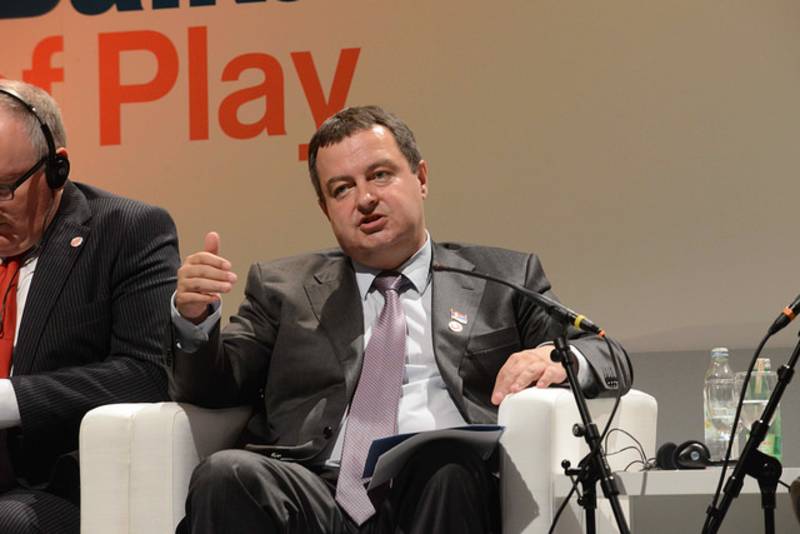 the eurozone has a green light to go deeper. Those who are ready should go into another orbit and a third orbit is for countries like Turkey and Ukraine.
the eurozone has a green light to go deeper. Those who are ready should go into another orbit and a third orbit is for countries like Turkey and Ukraine.
The EU is not simply an economic union but a political process, a union of values. In this regard, integration is indeed the main issue that needs much more attention. Several people spoke that often the process of integration is reduced to fulfilling technical criteria but, as a matter of fact, Miroslav Lajcak explained, this is a deep political process which transforms societies and "builds the EU in your countries". The EU does not force anyone to do anything, but joining the EU means not only adopting the acquis communautaire but also to apprehend the values, mentality, policies "and, yes, the EU statements" - a message directly addressed to Serbia which is still refusing to join the European positions on Russia. Miroslav Lajcak remained loyal to his thesis that change starts from within and it cannot be expected that local work can be done from the outside.
The issue of values was central for one of the panels during the Croatia Forum. At some point the conversation turned philosophical, but nonetheless it revealed one of the greatest problems of EU integration - the various perceptions of values and what exactly is their essence. Czech deputy Foreign Minister Petr Drulak called for caution when talking about values and especially about policy of values because they are perceived differently around the world. For instance, freedom, democracy and rule of law will not be rejected by US nor by China, but the devil is in the details, he explained. It is very important, when talking about values, to talk about whether we live according to them, noted Zlatko Lagumdzija, Bosnia and Herzegovina's foreign minister, who also proposed the development of a hierarchy of values.
Regarding values and the more complicated process of accession in general, Serbia's Foreign Minister Ivica Dacic said he strongly doubted that many of the current EU member states would pass the test of accession Serbia and Montenegro are currently going through. He proposed a systemic review to be held every ten years on whether all members fulfil the criteria. "I'm confident", he said, "that some member states would fail passing the current phase of negotiations we are going through. May be because they had the privilege to be founding members". Later, in an interview with this website, Mr Dacic said his proposal was not meant seriously but rather to show that the mentor attitude of the EU is counter-productive. But, still, the idea should not be ignored, especially against the backdrop of the growing problems in countries like Hungary and Bulgaria or in other EU member states for that matter too.
This is one of the reasons why the European Commission proposed the establishment of a special mechanism to monitor the respect for the rule of law and the new European Commission president, Jean-Claude Juncker, proposed a special commissioner to deal with this and also with the respect for human rights and fundamental liberties. This means that, may be, the day when the founding members, too, will have to answer the same questions as the candidates is not that far away. In the same spirit, Italy's top diplomat Federica Mogherini proposed a special commissioner to be appointed for the health-checks Ivica Dacic was talking about.
Because we are from the Balkans
The third very important plot were the bilateral relations between the countries from the region, a legacy from centuries of conflicts. Beyond facts, however, Macedonia's Foreign Minister Nikola Poposki made a very precise assessment of the reasons why the countries in the region do not at all or very slowly advance toward their European integration. "I think that we have developed a rationale in the Balkans of always complaining, of victimisation", he said and pointed out that this was in full contradiction to the Anglo-Saxon world view of always positive, innovative and problem-solving attitude. Another big problem, he said, is the "bilaterisation" of the enlargement process. This means when a member of the EU has problems with a candidate to block its integration process in spite of the EU's 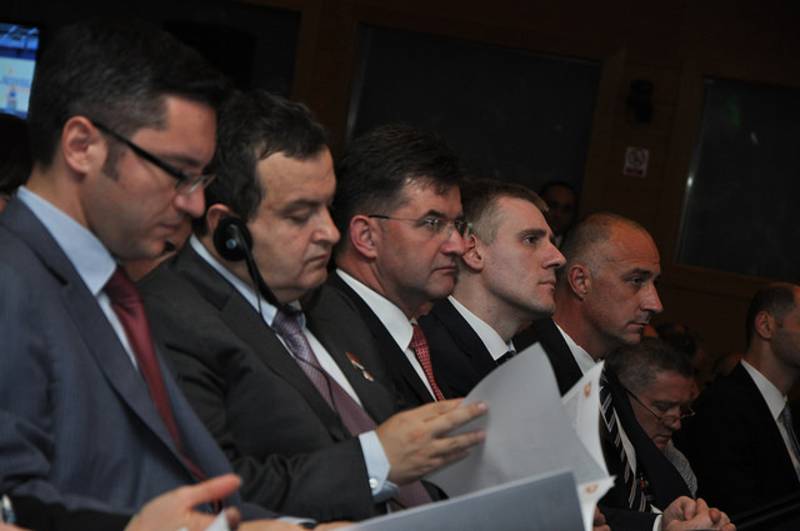 common view that enlargement is the most successful policy because it leads to significant social transformations.
common view that enlargement is the most successful policy because it leads to significant social transformations.
Michael Linhart, Austrian deputy foreign minister, said that single countries should not have the power to veto the enlargement process. Bilateral disputes have no place in EU conditionality the main purpose of which is to bring change, the diplomat added. This, though, will be a huge challenge, especially bearing in mind that in Dubrovnik the most frequently mentioned success of the EU was the Pristina-Belgrade dialogue, outlined also as the only EU foreign policy success, thanks to which Serbia has begun accession negotiations. Steven Blockmans from the Centre for European Policy Studies (CEPS) feared that copy-pasting of the dialogue as a model is not a solution because the name dispute between Macedonia and Greece is not a dispute between a candidate and a potential candidate but between a member state and a candidate. The issue, however, is not the model but whether there is political will, stated Kosovo's Foreign Minister Enver Hoxhaj and his Serbian counterpart Ivica Dacic during two different panels.
According to Mr Hoxhaj, the dialogue with Serbia was possible because of Kosovo's determination to stop looking in the past and instead look at the future. Moreover, Mr Hoxhaj said, Kosovo demonstrated political will to begin talks with Belgrade for the sake of the inter-ethnic relations in Bosnia and Herzegovina and the name issue between Skopje and Athens. "We wanted to serve as a good model how other challenges in the region can be solved", he said. "The Dayton agreement is not to be blamed for the relations in Bosnia and Herzegovina. The Constitution of Belgium is not responsible for the fact that there has been no government for a year. The real problem is the lack of political will. And if you ask me how did it come to signing of the Brussels agreement, what changed in Serbia? Nothing. What changed is the political will this to happen. And this made Serbia's progress in the European integration possible. That is why I urge all of us to understand that this really is a matter of political will", Ivica Dacic said.
And although he meant Bosnia and Herzegovina, a majority of politicians and analysts were convinced that Bosnia is a special case. Conditionality toward Bosnia is counter-productive because leading Bosnian politicians, in fact, do not want accession in the EU. Practically, the EU conditions shield them - as long as they do not comply they are safe because being a politician is one of the safest jobs in Bosnia and Herzegovina, said Wolfgang Petritsch from the Center for International Affairs at Harvard University. In late 1990s he was a special EU representative for Kosovo and a high representative of the international community for Bosnia and Herzegovina.
Ivan Vejvoda, senior deputy president of the German Marshall Fund, was a moderator of a unique round table in the end of the forum which brought together politicians and analysts. He opened the panel saying that only the special cases of the Western Balkans have remained to be integrated in the EU - the post-war states which still have very serious problems. One of them is democracy, said Vedran Džihić from the Centre for Advanced Studies of Southeast Europe. There is a democracy fatigue in the Western Balkan countries, mistrust among the citizens, a crisis of representation. There is a clear trend of increasing competitive authoritarian or semi authoritarian regimes. And as paradoxically as it may be, democracy is both part of the problem and part of the solution, the analyst explained. Bosnia and Herzegovina, Macedonia and Kosovo are special cases and if Serbia and Kosovo have made it why Bosnia and Herzegovina not to make it too, he asked and recommended a tailor made approach toward every country in the region, as Croatia proposed too.
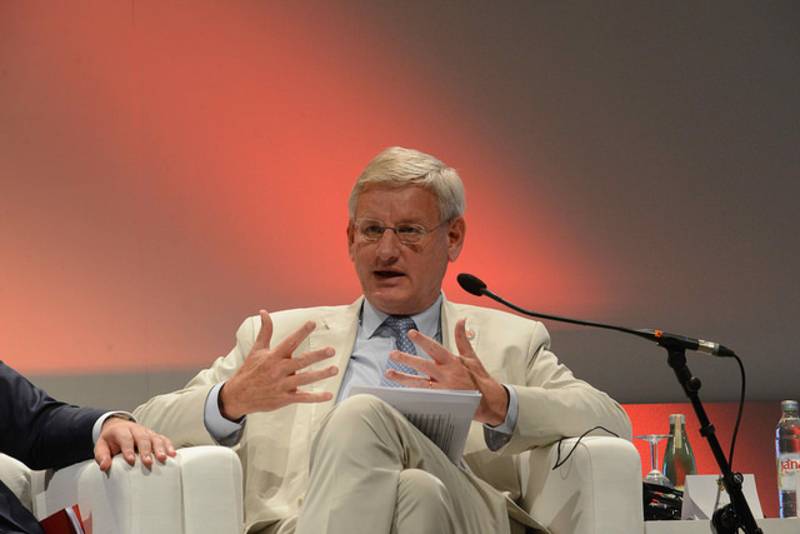 About the danger of authoritarianism spoke also Dimitar Bechev, already ex-chief of the Sofia office of the European Council on Foreign Relations (ECFR). He called the trend a return of the "strong-man model". According to him, there is no need to name a specific country because this process can be observed in more than one state. Serbia, however, is a huge risk, according to Sonja Biserko, president of the Helsinki Committee for Human Rights in Serbia. She was very blunt and in the presence of the country's first deputy Prime Minister and Minister of Foreign Affairs Ivica Dacic she said that the current government is a real danger for Serbia, for the democracy and the liberation of society because of the concentration of power. Practically, there is no viable opposition with different thinking, the parliament is weak, media are not a factor of change but of the status quo. The EU means values. It is very important Serbia to apprehend these values and that is why membership in the EU and NATO is essential. And one more thing, she said, the lack of political will for dealing with Milosevic's past hampers not only the normalisation of the region but within Serbia itself.
About the danger of authoritarianism spoke also Dimitar Bechev, already ex-chief of the Sofia office of the European Council on Foreign Relations (ECFR). He called the trend a return of the "strong-man model". According to him, there is no need to name a specific country because this process can be observed in more than one state. Serbia, however, is a huge risk, according to Sonja Biserko, president of the Helsinki Committee for Human Rights in Serbia. She was very blunt and in the presence of the country's first deputy Prime Minister and Minister of Foreign Affairs Ivica Dacic she said that the current government is a real danger for Serbia, for the democracy and the liberation of society because of the concentration of power. Practically, there is no viable opposition with different thinking, the parliament is weak, media are not a factor of change but of the status quo. The EU means values. It is very important Serbia to apprehend these values and that is why membership in the EU and NATO is essential. And one more thing, she said, the lack of political will for dealing with Milosevic's past hampers not only the normalisation of the region but within Serbia itself.
It's also the economy, stupid!
Last but not at all least is the plot about the economy. The region's greatest problem are the weak perspective for economic development, said Vladimir Gligorov from the Vienna Institute for International Economic Studies, son of late Macedonian President Kiro Gligorov. EU does not practically change the economic dynamics in the region neither through the process of integration nor through other conditions. It was surprising to him that there is stability given that the region was most affected by the crisis. This, however, should not be taken for granted. Peter Sorensen, the head of the EU delegation in Bosnia and Herzegovina, said that the real problem is the lack of economic fundamentals in the region and especially in Bosnia and Herzegovina.
The most important task of the EU is to overcome the economic difficulties, said Hungary's Foreign Minister Tibor Navracsics, who has been officially named by the government in Budapest as the next Hungarian EU commissioner. According to him, both the member states and candidate countries should enhance their budget discipline and revive their market economies. The EU is not able to qualify neither of the Western Balkan countries as a functioning market economy, said Swedish Foreign Minister Carl Bildt, adding that this is a problem because more Tuzlas are possible in the region (following the mass social protests in Bosnia and Herzegovina in the beginning of the year), unless focus is shifted onto structural reforms. Without the economy nothing else will work, said Bruno Maçães, state secretary for foreign affairs of Portugal who had just finished a tour around several Balkan states.
He said that another big problem in the region is that the number of versions of the situation one can hear depends on how many people you meet. He said he met with more than 30 people and heard more than 30 versions. There is a fundamental problem in the dialogue between the EU and these countries, he believes. Not only politicians, but the public opinion, intellectuals and analysts as well believe the EU can come and solve all of their problems. However, the EU does not work like that. "We're not an empire. We work through consensus and dialogue". Another myth in these countries is that the EU represents a single point of view. This is not true, the Portuguese diplomat continued. The EU is a constellation of views. The common thing, though, is values. To him, a huge lesson from his tour is that he understood that there are fundamental differences in the political and philosophic tradition. Generally, in Europe, traditions are formed by John Locke and Thomas Hobbes. This foundation can be found to a certain extent in the countries from the Western Balkans but it is necessary that they "adapt to our values", he concluded.
Lessons for the EU and the region
Currently, the two main candidates for the post of EU high representative for foreign affairs lack a focus on the Western Balkans. Whoever of them or a third person would be appointed he or she should watch all the discussions from this year's Croatia Forum because if there was something everyone agreed on in Dubrovnik is that without the Western Balkans the European integration will not be completed. Besides, it also became clear that they are part of a geopolitical game which Putin's Russia is currently playing. That is why, the next European Commission should be very cautious and at the same time bold in its approach to the region because several things became crystal clear during this forum. One is that the problems within the EU have a direct impact on the moods toward enlargement. Second, integration is the key process, not enlargement. Third, problems cannot be resolved with technical means but via a deep and long-term engagement.
The former Bulgarian foreign minister was not less frank than his colleagues when he said that some problems are better resolved when a country is in the EU than outside and that the integration does not end with membership. Kristian Vigenin said this after he was pushed by German MP Gernot Erler who asked with an apology for being undiplomatic the question whether it was a mistake that the EU accepted Bulgaria on 1 January 2007 unprepared. Many of the politicians, analysts and journalists from the old member states urged for an honest talk with the citizens to explain to them that the integration of the Western Balkans is necessary. In the same time, however, the countries from the region should show solid proof that they can deliver.
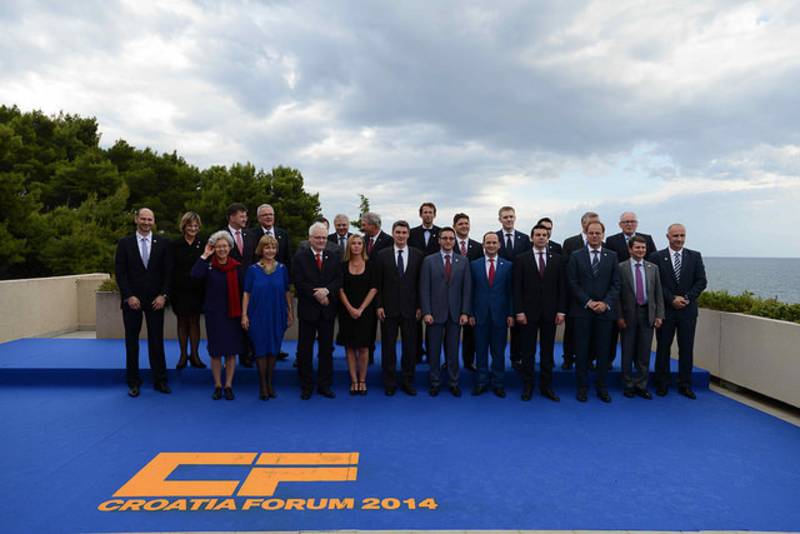 The EU should radically change its approach toward the Western Balkan countries. The European semester should be fully integrated in the accession process not only adapted. These countries should participate in one form or another in the construction of the EU instead of only allowed to automatically apply the new legislation. And it is obvious that the new Serbian government will be a motor of such an approach judging from the directness with which it approaches the EU without underestimating what Serbia needs to do. Something that should be used well. As the Czech deputy foreign minister suggested, these countries should be involved in the EU values instead of these values being imposed on them. The EU needs to work more with the civil society, not only the politicians in these countries. And most of all, it is important to put an end to the current practise of blocking the European integration because of bilateral problems. It is true that every case is specific, but it is important to bear in mind that the biggest danger for the region is EU's indifference, as Yves Rossier said, state secretary of Switzerland for foreign affairs. "Experience of Ukraine tells us what it means when the aspirations of the populations have been ignored during 20 years. We know where this leads to", he said.
The EU should radically change its approach toward the Western Balkan countries. The European semester should be fully integrated in the accession process not only adapted. These countries should participate in one form or another in the construction of the EU instead of only allowed to automatically apply the new legislation. And it is obvious that the new Serbian government will be a motor of such an approach judging from the directness with which it approaches the EU without underestimating what Serbia needs to do. Something that should be used well. As the Czech deputy foreign minister suggested, these countries should be involved in the EU values instead of these values being imposed on them. The EU needs to work more with the civil society, not only the politicians in these countries. And most of all, it is important to put an end to the current practise of blocking the European integration because of bilateral problems. It is true that every case is specific, but it is important to bear in mind that the biggest danger for the region is EU's indifference, as Yves Rossier said, state secretary of Switzerland for foreign affairs. "Experience of Ukraine tells us what it means when the aspirations of the populations have been ignored during 20 years. We know where this leads to", he said.
There is a new trend of building new division lines and a lack of political clarity what comes next, said Albania's Foreign Minister Ditmir Bushati. Many criticised sharply Jean-Claude Juncker's statement that in the next five years there will be no further enlargement. This is a harmful message. EU Enlargement Commissioner Stefan Fule said there cannot be a pause and a time for digesting enlargement because the rules of the game had changed. "It's time to return to the values", the Commissioner added. "Probably Juncker's statement is true", the Swedish top diplomat Bildt added, "but if this is the only sentence about enlargement it sends the wrong message". It increases the risks. The word "enlargement" is not present in the June 26-27 strategic guidelines of the EU. Without enlargement, there are significant security risks for Europe, he warned.
The forum in Dubrovnik offered accurate diagnoses and many ideas. It can be used as a manual to address the problems and to find appropriate solutions. The Croatian government has made, may be, the most important contribution so far in the EU - a recipe for integration of the region. It will be an epic failure if the next Commission and high representative miss the golden opportunity to prepare the best programme for the integration of the Balkans, especially in the current geopolitical situation.
 Bakir Izetbegovic, Andrej Plenkovic | © Council of the EU
Bakir Izetbegovic, Andrej Plenkovic | © Council of the EU Aleksandar Vucic, Recep Tayyip Erdogan | © Serbian Presidency
Aleksandar Vucic, Recep Tayyip Erdogan | © Serbian Presidency Jean-Claude Juncker, Zoran Zaev | © European Commission
Jean-Claude Juncker, Zoran Zaev | © European Commission